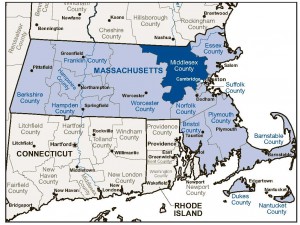Middlesex County was created on 10 May 1643 as one of the original four counties of the Massachusetts Bay Colony. The other original counties were Essex, Suffolk, and a now extinct Norfolk – a name later reused for a different geographic region in the state.
At its founding, Middlesex County covered a broad swath of Massachusetts. The county was bordered to the north by New Hampshire, to the east by Essex County, to the south by Suffolk County, and to the west by New York – until Hampshire County was created in 1662. Middlesex’s western boundary was altered again by the creation of Worcester County in 1731. Now, and for the first time ever, historic Middlesex County probate records are fully searchable online – and for free!
Throughout the period covered in these records, Middlesex was the most populated county in Massachusetts, with some 275,000 residents by the 1870 U.S. census. Available on AmericanAncestors.org, and made possible through a partnership with the Massachusetts Supreme Judicial Court Archives, this database includes more than 45,000 probate cases between 1648 and 1871. The cases include wills, guardianships, administrations, and various other types of records.
Probate records are data-rich genealogical documents often containing information about the date and place of death of the subject, the subject’s marital status, spouse’s name, children’s names, relationships between family members, residences, inventories of property, and perhaps even the subject’s mark or signature. For a New England researcher, these records should prove invaluable for providing detailed information on individuals who resided in the region from its earliest days to the late nineteenth century.
The following towns – with the year in which they were established – are included in this database:
Acton (1735), Arlington (1807), Ashby (1767), Ashland (1846), Bedford (1729), Belmont (1859), Billerica (1655), Boxborough (1835), Brighton* (1806), Burlington (1799), Cambridge (1636), Carlisle (1780), Charlestown* (1630), Chelmsford (1655), Concord (1635), Dracut (1701), Dunstable (1673), Everett (1870), Framingham (1700), Groton (1655), Holliston (1724), Hopkinton (1715), Hudson (1866), Lexington (1713), Lincoln (1754), Litchfield** (1734) Littleton (1715), Lowell (1826), Malden (1649), Marlborough (1660), Medford (1630), Melrose (1850), Natick (1781), Newton (1688), North Reading (1853), Nottingham** (1733), Pepperell (1775), Reading (1644), Sherborn (1674), Shirley (1775), Somerville (1842), Stoneham (1725), Stow (1683), Sudbury (1639), Tewksbury (1734) , Townsend (1732), Tyngsborough (1809) , Wakefield (1812), Waltham (1738), Watertown (1630), Wayland (1780) , Westford (1729) , Weston (1713), Wilmington (1730), Winchester (1850), and Woburn (1642).
* Brighton and Charlestown were annexed by Boston in 1874.
** Litchfield and Nottingham were ceded to New Hampshire in 1740.
Happy searching!
Share this:

About Ryan Woods
An educator and historian, Ryan J. Woods is President & Chief Executive Officer of American Ancestors. For more than two decades, he has dedicated his professional life to developing experiences to educate, inspire, and connect people through the exploration of history, heritage, and culture. Since joining the American Ancestors staff in 2007, he has played a key role bringing the enduring power and promise of family history to people across the country and around the globe. He was the lead creator of AmericanAncestors.org. By fostering important collaborations with commercial and nonprofit partners, he recruited more than 1 billion searchable records to American Ancestors. He also led the collaborative effort to establish our Jewish Heritage Center. Currently, Ryan is focused on record access, partnerships, business planning for capital expansion, the creation of a national visitor destination experience, and the launch of 10 Million Names. Ryan serves in leadership roles for several nonprofit organizations including as chairman of the Committee on Heraldry; appointed commissioner of the Special Commission for the 250th Anniversary of the American Revolution in the Commonwealth of Massachusetts; advisory board member for the 250th Anniversary of the Boston Tea Party; Secretary-General of the 36th International Congress of Genealogical and Heraldic Sciences; member of the Committee on Pretensions of the Society of the Cincinnati in the State of Connecticut; Deputy Governor of the Society of Colonial Wars in the Commonwealth of Massachusetts; partner representative on the Mayor of Boston’s Green Ribbon Commission; and past-President of the Boston University School of Education Alumni Association. Ryan is also an active Mason, belonging to The Lodge of Saint Andrew, where he serves as an appointed officer. He is a member of the Order of Saint John, the Colonial Society of Massachusetts, the Mayflower Society, the Sons of the Revolution, the Saint Nicholas Society of New York City, and the Afro-American Historical and Genealogical Society. In 2022, Ryan was elected an Honorary Life Fellow of the Massachusetts Historical Society. He also was honored by the New England Society in the City of New York (founded 1805), with the Townsend Award “in recognition of outstanding achievement representing the finest attributes of the New England character.” Prior to joining American Ancestors, he held several positions at other cultural and historical institutions, including the National Archives and Records Administration (NARA). During his tenure with NARA, he received the Archivist of the United States' Award for Outstanding Public Service. A dedicated researcher, Ryan has authored pedagogical articles about the use of historical biographies to teach character and ethics and contributed genealogical articles and several book forewords for historical and genealogical publications. Born in Houston, Texas and raised along Lake Champlain in Vermont, Ryan attended Boston University earning undergraduate and graduate degrees in history education.View all posts by Ryan Woods →
